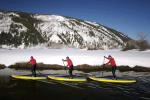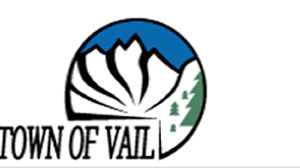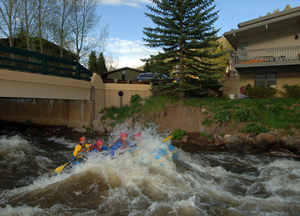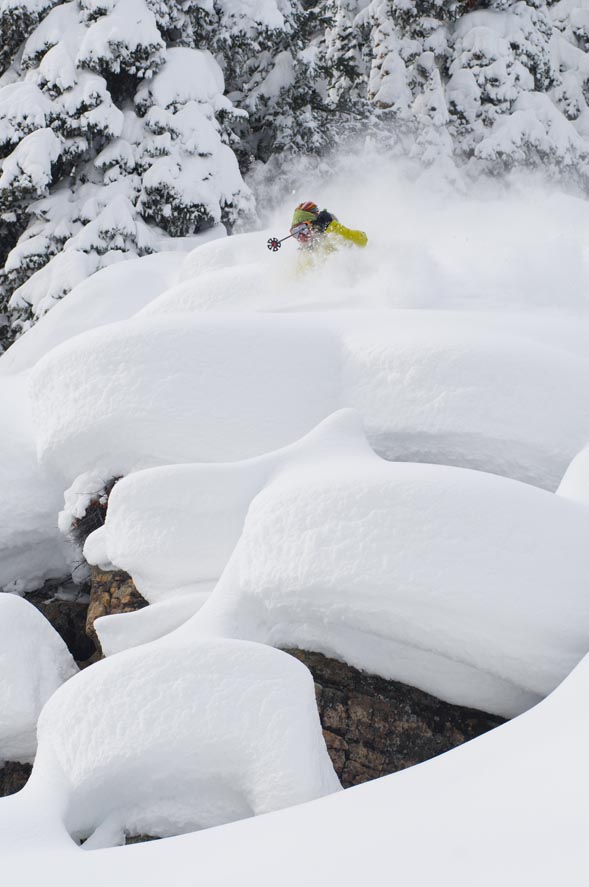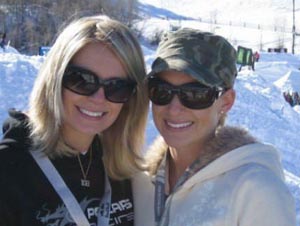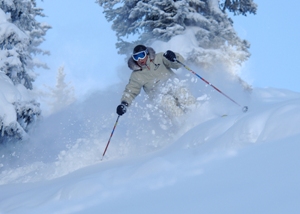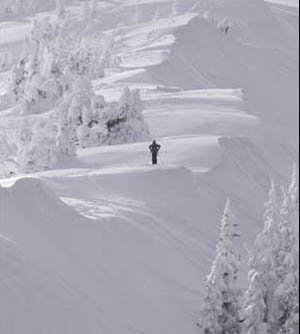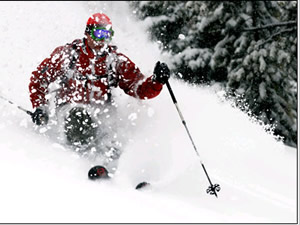
Courtesy of Vail Resorts vail.snow.com
10 inches of fresh snow caps 42-inch hammering since last Friday
January 30, 2009 —
For the first time in a week, as I settled down to write my blog late Thursday night – a cocktail in hand and the kids finally in bed – I noticed it’s not snowing outside my West Vail home.
This qualifies as news because of the killer storm cycle we just enjoyed. All the way back to last Thursday night (Jan. 22), when the first storm band came in as rain, we’ve had something falling out of the sky virtually every day and every night. And most of it’s been classic Colorado snow.
Once the warmth got sucked out of the jet stream, the heavens emptied with lots of white, dry fluff. And with the 10 inches of cold new snow we got Wednesday night into Thursday morning, Vail has had 42 inches since last Friday. That puts the seasonal total at 260 inches, just 90 shy of our 350-inch annual average.
Thursday (Day 24) was top three for me – endless, deep laps on Rasputin’s and Genghis. So freaking good. The forecast calls for a warm, sunny weekend to get out and enjoy all the bounty, so be sure to check it out.
Now on to more weighty matters.
Gov. Bill Ritter’s comment Thursday that Colorado’s ski and hospitality industries are being hurt by tougher state immigration laws adopted in 2006 is only partly true.
Speaking before a University of Denver panel studying the impacts of immigration, Ritter said the 2006 laws adopted during a special legislative session –- setting stricter standards to receive state benefits –- have made it more difficult for tourism-based industries to find workers.
This ski season, in the wake of the overall economic meltdown and rising unemployment nationally, ski areas have actually been turning foreign workers away. But in the past the industry was heavily reliant on H2-B visas for workers from Europe, South America and Australia who operate chairlifts, staff restaurants and hotels, teach skiing and drive buses.
Most industry experts, though, say the biggest hurdle for ski areas trying to attract foreign workers has been congressional gridlock over comprehensive immigration reform.
Industry executives want to increase the number of H2-B visas and allow workers to return season after season, but Congress has lumped that request in with the debate over illegal immigration from Mexico and Central America.
The DU panel is expected to produce a report with policy recommendations on immigration issues in December.
Interior Secretary Ken Salazar in recent days has dampened the hopes of state lawmakers who are pushing to revive Colorado’s long-dormant oil shale industry.
In Lakewood Thursday to visit the scandal-plagued offices of the Minerals Management Service (MMS) with a message of sweeping reform, Salazar in recent days has also clearly signaled he will try to slow the pace of oil-shale development on the Western Slope.
That flies in the face of efforts by Republican state lawmakers such as Sen. Kevin Lundberg (see story in Real News) to take advantage of last-minute Bush administration regulations on oil shale production and provide incentives to the oil and gas industry at the state level.
In an Associated Press (AP) interview Tuesday and again in a White House press briefing Wednesday, Salazar urged a slow approach to oil shale for environmental reasons and repeated that he will review Bush administration “midnight” regulations that put in place an oil shale management plan and set royalty rates for production on federal lands.
According to the AP, Salazar:
– Cautioned against pushing too fast on oil shale development in Colorado, Wyoming and Utah until more is known about the impact on water resources and climate change. Oil shale extraction requires a lot of water that could strain the resources of the Colorado River and huge amounts of electric power that could impact climate change, he said. “We’re going to have to be very thoughtful in the way it’s going to be developed.”
– Promised to review at least 10 “midnight regulatory actions” by the outgoing Bush administration, citing as examples regulations to limit the reach of the Endangered Species Act, oil shale permitting, and oil and gas permits issued near two national parks in Utah.
“I’m troubled by many of the ‘midnight’ actions by the administration. We’ll take a look at them one at a time and make the right decision going forward,” Salazar said.
Lundberg, in an interview with RealVail.com Tuesday called such federal policy “shortsighted. …
“We as a nation, I am hopeful that we will start figuring out that we need more energy, not less, and that it is in our best interest at every level that we encourage responsible production of all of our energy resources,” Lundberg said, referring to a bill he plans to reintroduce in the state Senate giving oil companies a 20 percent severance tax break until 2020.
“Here in Colorado, we have a great deal [of domestic energy] to draw on, not the least of which is oil shale. You could argue the opposite [of Salazar], that oil shale is the future of energy production in Colorado, and I believe we need to encourage it."
![]() Comment on "10 inches of fresh snow caps 42-inch hammering since last Friday " using the form below
Comment on "10 inches of fresh snow caps 42-inch hammering since last Friday " using the form below





